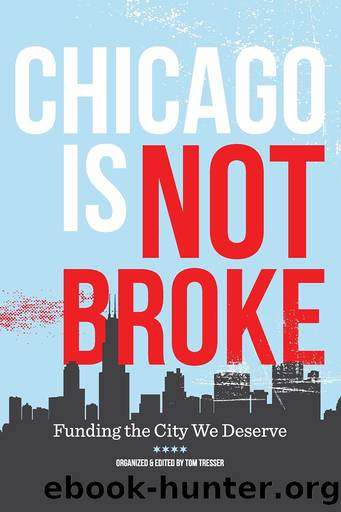Chicago Is Not Broke. Funding the City We Deserve by Tom Tresser

Author:Tom Tresser [Tresser, Tom]
Language: eng
Format: epub
Tags: Political Science, Public Policy, City Planning & Urban Development
ISBN: 9781365109775
Google: eTqxAQAACAAJ
Amazon: B01J4UPK4C
Barnesnoble: B01J4UPK4C
Goodreads: 31424649
Publisher: The CivicLab
Published: 2016-07-10T07:01:54+00:00
It has taken many years of failed revenue and spending policy to create the current budget problems. Itâs important to get the history and context of Illinoisâ budget crisis.
For the last fiscal year budget passed in 2014, Illinois had a $32 billion budget with $21 billion of hard costs, such as pension payments and debt owed and $3 billion in unpaid bills. The rest was a general fund budget of $24 billion for education, healthcare, human services, public safety and other programs benefiting our citizens, leaving at $6 billion deficit covered by borrowing.
Many factors have led to budgeting with a deficit, including poor tax policy through which Illinois overtaxes the poor and the middle class while refusing to raise taxes on higher income earners. A bill passed decades ago allowing small payments to the state pension benefits and ramping up those payments to unsustainable levels has contributed greatly to the budget deficit. The General Assembly also decided to skip some of those statutorily required pension payments rather than address revenue needs. Even with those shortcuts, over a decade of cuts to spending on basic human services has ultimately caused more expense in the long run. The recession of 2008 exacerbated the current faulty fiscal practices, requiring a flat tax increase to meet basic budgetary needs.
In 2011 a temporary income tax increase was passed during a lame duck session without bipartisan support. Was the temporary tax increase necessary and worth it? It was absolutely worth it since it prevented the deficit from growing exponentially. Although the state budget still operated in a deficit and required borrowing, had the temporary tax not been passed, the deficit would have been over $30 billion as opposed to $6 billion at the end of 2014.
The expiration of the income tax rate in 2015 resulted in a decrease in the personal income tax from 5% to 3.75% and the corporate tax from 7% to 5.25%. In a time of absolute necessity for revenue, the sunset of this temporary tax created further chaos in the state budget. Going into 2015, the state budget already had a $5.9 billion deficit. With the sunset of the temporary income tax, $4.6 billion less revenue was collected making the deficit hole even bigger.
Download
This site does not store any files on its server. We only index and link to content provided by other sites. Please contact the content providers to delete copyright contents if any and email us, we'll remove relevant links or contents immediately.
The Secret History by Donna Tartt(19052)
The Social Justice Warrior Handbook by Lisa De Pasquale(12187)
Thirteen Reasons Why by Jay Asher(8893)
This Is How You Lose Her by Junot Diaz(6877)
Weapons of Math Destruction by Cathy O'Neil(6264)
Zero to One by Peter Thiel(5786)
Beartown by Fredrik Backman(5737)
The Myth of the Strong Leader by Archie Brown(5499)
The Fire Next Time by James Baldwin(5431)
How Democracies Die by Steven Levitsky & Daniel Ziblatt(5215)
Promise Me, Dad by Joe Biden(5141)
Stone's Rules by Roger Stone(5081)
A Higher Loyalty: Truth, Lies, and Leadership by James Comey(4954)
100 Deadly Skills by Clint Emerson(4921)
Rise and Kill First by Ronen Bergman(4779)
Secrecy World by Jake Bernstein(4741)
The David Icke Guide to the Global Conspiracy (and how to end it) by David Icke(4707)
The Farm by Tom Rob Smith(4502)
The Doomsday Machine by Daniel Ellsberg(4484)
